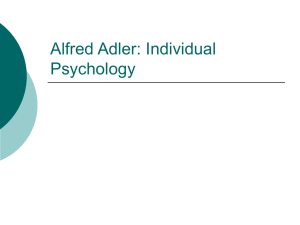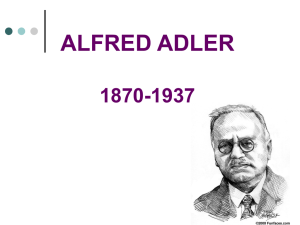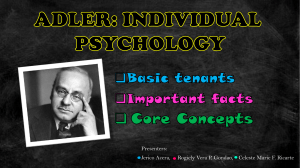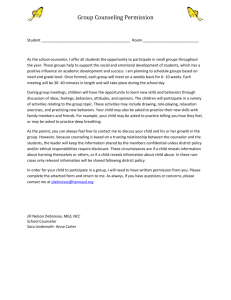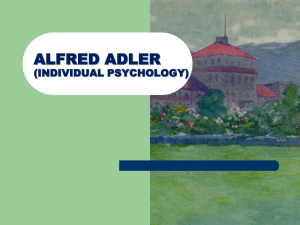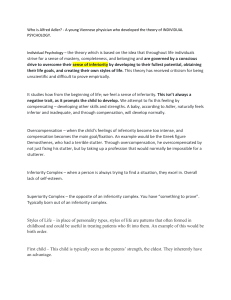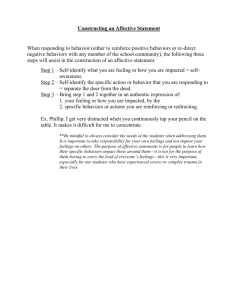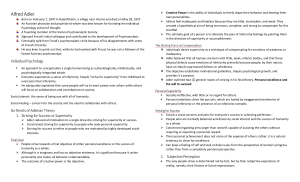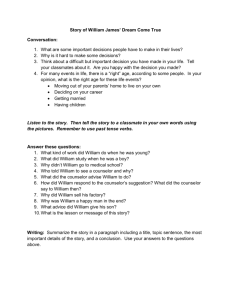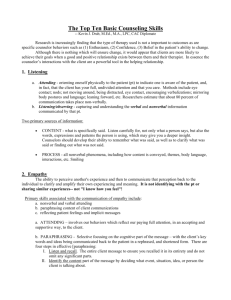Counseling Theories 517
advertisement
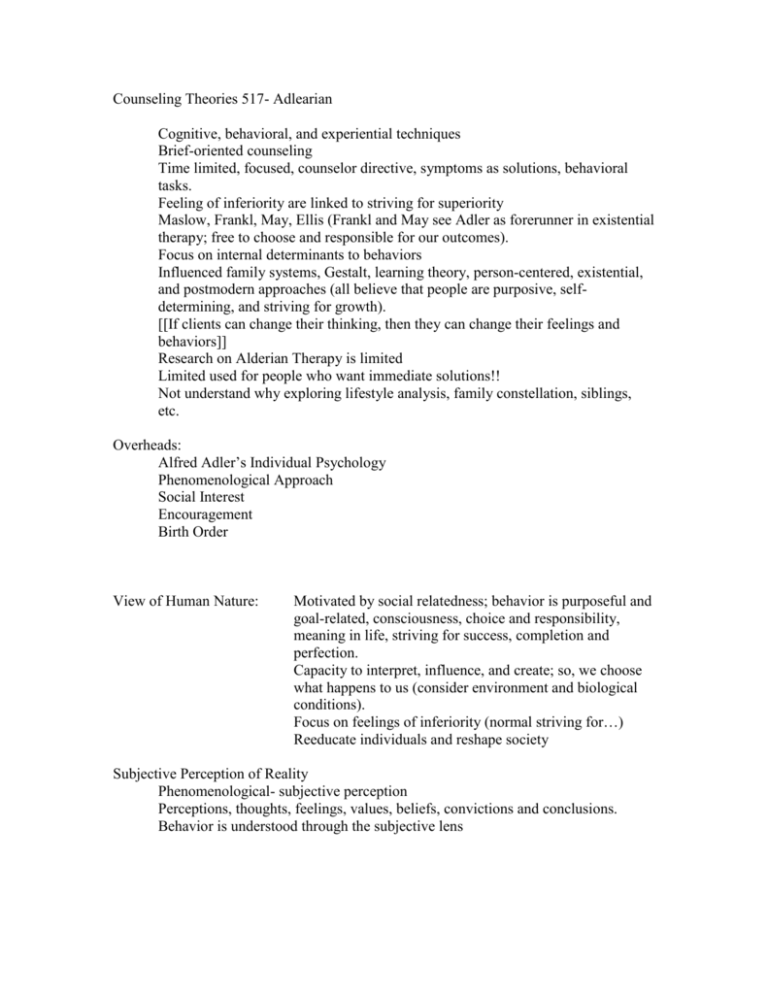
Counseling Theories 517- Adlearian Cognitive, behavioral, and experiential techniques Brief-oriented counseling Time limited, focused, counselor directive, symptoms as solutions, behavioral tasks. Feeling of inferiority are linked to striving for superiority Maslow, Frankl, May, Ellis (Frankl and May see Adler as forerunner in existential therapy; free to choose and responsible for our outcomes). Focus on internal determinants to behaviors Influenced family systems, Gestalt, learning theory, person-centered, existential, and postmodern approaches (all believe that people are purposive, selfdetermining, and striving for growth). [[If clients can change their thinking, then they can change their feelings and behaviors]] Research on Alderian Therapy is limited Limited used for people who want immediate solutions!! Not understand why exploring lifestyle analysis, family constellation, siblings, etc. Overheads: Alfred Adler’s Individual Psychology Phenomenological Approach Social Interest Encouragement Birth Order View of Human Nature: Motivated by social relatedness; behavior is purposeful and goal-related, consciousness, choice and responsibility, meaning in life, striving for success, completion and perfection. Capacity to interpret, influence, and create; so, we choose what happens to us (consider environment and biological conditions). Focus on feelings of inferiority (normal striving for…) Reeducate individuals and reshape society Subjective Perception of Reality Phenomenological- subjective perception Perceptions, thoughts, feelings, values, beliefs, convictions and conclusions. Behavior is understood through the subjective lens Unity and Patterns of Human Personality Individual psychology- a person can only be understood holistically and systematically. People are social, creative, decision-making beings who act with purpose. We are whole, born, reared; live in familial, social, and cultural contexts. 6 years of age our fictional vision of ourselves as perfect or complete forms into a life goal. This life goal unifies the personality. Purposeful behavior Fictional Finalism- imagined central goal guides behaviors. Guiding self-ideal Goal of perfection Jerry Springer, Criminal behaviors, denial, students in trouble, etc… Strive significance and superiority is innate because at a younger age we realize how helpless we are and feel inferior. The moment we experience inferiority we strive for superiority (moving from a perceived lower to a perceived higher position). People can change weaknesses into strengths through compensation. Lifestyle is core beliefs and assumptions to reality and finds meaning in life events (values and perceptions to self, others, and life). Unifies our actions. Environment influences not causes of what to become. People create styles (creative, intellect, artistic, athletic) and experience profound effects during the first 6 years of life. Interpretations of events shape personality. Faulty interpretations lead to mistaken notions in our private logic. Once become aware of patterns and continuity we modify the faulty assumptions- reframe childhood experiences. Problems arise because conclusions based on private logic do not conform to the requirements to social living. Social Interest and Community Feeling Aware of being apart of the human community and to attitudes living in a social world. Social interest is striving for a better future for humanity. Begins in childhood and each develops a sense of belonging and of contributing. This is taught, learned and used. We seek a place in family and society to fulfill basic needs. Anxiety results if not fulfilled. Master 5 life tasks [Adler, Dreikurs, & Mosak]: 1. friendships (social) 2. intimacy (love-marriage) 3. contribution to society (occupational) 4. get along with self (self-acceptance) 5. spirituality (values, meaning, life goals, relationships with universe/cosmos) [[psychological disorder results is one tasks experiences dysfunction]] Birth Order and sibling relationships Five Psychological positions: 1. oldest child 2. second child 3. middle child 4. youngest 5. only Sibling relations play a key role in the family and social structures. Techniques: Phase 1- Establishing relationship Phase 2- Explore individual dynamics Phase 3- Encourage self-understanding and insight Phase 4- Reorientation Therapeutic Process: Goals Discover purposes to behavior or symptoms and basic mistakes associated with coping. Correct faulty assumptions and conclusions. Function of counselor is to complete a comprehensive assessment of client’s functioning Family constellation questionnaire Early recollections as a diagnostic tool (reflect biases, convictions, attitudes, and evaluations in which we presently live) Nonpathological perspective- do not label according to diagnosis (Growth model). Role of Counselor Assist in better understanding, challenging, and changing client’s life story. Client’s experience Recognize errors in their thinking (challenge and doubt past decisions) Fearful of leaving old patterns. Client’s explore private logic (concepts of self, others and life) in which lifestyle is based. Private logic is focus for treatment. “I must be perfect, I must, get what I want in life, I must…” Feelings are aligned with thinking and fuel behaviors. We think, feel, act. Offer discouraged client’s encouragement! Relationship Cooperation, trust, respect, confidence, and alignment of goals Counselor models communication and acts in good faith! Dinkmeyer and Sperry suggest the use of therapeutic contracts. Goals are created and responsibility is known. This is not a requirement of Adlerian Therapy.
